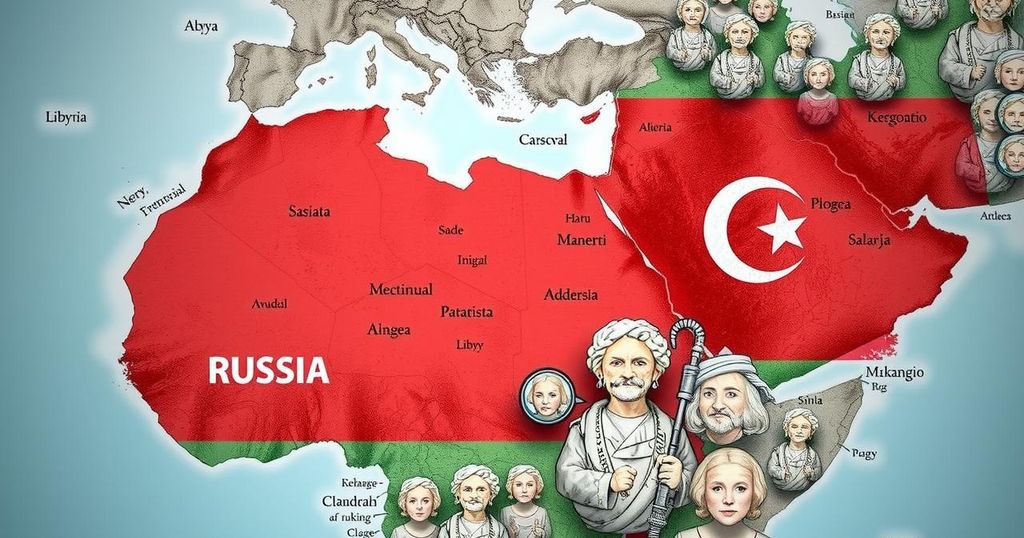World news
AFP, AFRICA, AHMED AL - SHARAA, ARMS TRADE, ASIA, ATLANTIC, BASHAR AL - ASSAD, BELARUS, CENTRAL AFRICAN REPUBLIC, CONFLICT RESOLUTION, EUROPE, EUROPE/ASIA, EYES ON WAGNER, GOVERNMENT OF NATIONAL UNITY, JA, KHALIFA HAFTAR, KR, KREMLIN, LIBYA, MEDITERRANEAN, MIDDLE EAST, MILITARY, MOROCCO, MOSCOW, NORTH AMERICA, RUSI, RUSI THINK TANK, RUSSIA, RUSSIA-UKRAINE WAR, SAHARAN AFRICA, SAHEL, SPARTA, SUDAN, SYRIA, SYRIAN, TO, TOBRUK, TURKEY, UK, UNITED STATES, WAGNER, WAR
Jamal Robinson
0 Comments
Russia Shifts Strategic Focus to Libya Following Syria’s Political Turmoil
The upheaval in Syria has driven Russia to shift its attention towards Libya as a strategic base in Africa, where it supports Khalifa Haftar against the UN-recognized Tripoli government. This transition aims to preserve Russian interests in Africa amidst declining influence in Syria. Military resources, including advanced weapons systems, are being transferred from Syria to Libya, although the political dynamics in Libya may pose significant challenges for Russia’s ambitions.
Following the unexpected downfall of Syrian President Bashar al-Assad, Russia appears to be refocusing its geopolitical strategy towards Libya as a new operational base in Africa. Previously, Russia utilized a military port and an airbase in Syria for its missions across the Mediterranean and sub-Saharan Africa; however, the abrupt political shift in Syria has compelled the Kremlin to seek a strategic retrenchment. The newly appointed Syrian leader, Ahmed al-Sharaa, expressed gratitude towards Russia, emphasizing its importance in Syria, yet the situation is becoming increasingly precarious for Moscow.
In Libya, Russian interests are currently directed towards supporting Field Marshal Khalifa Haftar, who commands control over eastern Libya. Haftar’s aspirations align with Russia’s desire to maintain its operations in Africa, particularly in light of the challenges posed by the evolving political landscape in Syria. As observed by Jalel Harchaoui of the Royal United Services Institute, this shift is indicative of a self-preservation approach, intended to safeguard Russia’s interests in Africa amidst the decline of its influence in Syria.
Recent investigations unveiled Russia’s heightened military involvement in Libya, highlighting the delivery of military equipment and the presence of hundreds of Russian troops. Intelligence reports suggest a significant transfer of Russian military resources to Libya, including advanced anti-aircraft systems, which signifies a strategic pivot for Moscow. Experts opine that this transition not only represents the replacement of one regional proxy with another but also signifies Russia’s ongoing efforts to extend its strategic influence in the region.
With aspirations to undermine Western interests in Libya, Russia’s involvement under Haftar’s command presents both opportunities and challenges. Observers contend that although the situation in Libya offers potential advantages for Moscow, the complexities of the political landscape and existing Western alliances may limit Russia’s maneuvers. The presence of multiple regional actors, including Turkey and Egypt, further complicates Russia’s ambitions, leading to heightened scrutiny of its military operations in Libya.
Furthermore, it is critical for Russia to remain vigilant and adaptable in the event that its alliance with Haftar deteriorates, contrasting the previous strategy adopted in Syria. The necessity for a backup strategy should Haftar’s fortunes decline underscores the volatile nature of geopolitics in the region.
Overall, while Libya may serve as an appealing alternative for Russia following its setbacks in Syria, achieving the desired level of influence will be notably challenging given the multifaceted dynamics at play.
The situation in Libya has become a focal point for Russia as it seeks to re-establish its influence in Africa following the political upheaval in Syria. After maintaining a strategic foothold in Syria through the support of Bashar al-Assad, Russia now faces the challenge of reorienting its military and diplomatic strategies. The changing political landscape in Libya, characterized by a fragmented power structure and competition among international players, offers both a potential opportunity and a complex environment for Moscow’s ambitions.
In conclusion, Russia’s redirection of focus to Libya reflects its necessity to adapt strategically in the face of shifting political realities in Syria. While Libya presents opportunities for extending Russian influence in Africa, the challenges posed by a competitive geopolitical landscape and the presence of diverse regional actors may complicate Moscow’s objectives. Therefore, Russia will need to navigate this intricate landscape carefully while developing contingency plans should its alliance with Haftar falter.
Original Source: thedefensepost.com




Post Comment